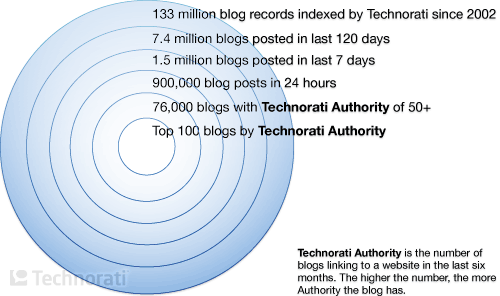It's the second half of 2008, and contrary to some doomsday predictions, blogging has yet to reach its peak. The blogosphere has continued to expand, according to Technorati's State of the Blogosphere 2008 report, and we are now beginning to learn more about what powers the blogging community. Though growth has slowed, bloggers are apparently becoming pretty savvy at making money while pursuing their blogging interests.
133 million blogs have been tracked by Technorati between 2002 and now. This number is almost double the 72 million tracked as of March of 2007, and quite a bit higher than the 35 million from spring of 2006 and 8 million from 2005. Though blogging in general is still on the upswing, the growth rate has clearly slowed in recent years—a trend that we noted last year as well. It is taking longer and longer for the rate of new blogs to double (not too surprising, as we're getting into pretty big numbers here), but also the rate of new blog posts per day is actually going down. Technorati says that it has tracked 900,000 new blog posts per day in its latest report, which is almost 600,000 per day lower than the numbers posted in March of 2007 (1.5 million per day).
That may not be a bad thing, however. As the act of blogging begins to mature and dilettantes begin to drop out, those who are succeeding are really succeeding. Technorati surveyed a number of bloggers to find out more about the demographics of this group and found that many are making money from their blogs. "The majority of bloggers we surveyed currently have advertising on their blogs," wrote Technorati. "The mean annual revenue is $6,000 with $75K+ in revenue for those with 100,000 or more unique visitors per month." The company notes, however, that the median revenue is significantly lower—about $200 per year for US and European bloggers. One Ars staffer who runs a handful of personal blogs told me that he made $400 or so in advertising so far this year, which has grown from $300 per year in 2007. That may not be enough to live off of, but it's at least worth a few nice dinners.
Aside from advertising, some bloggers are also making money by writing professional blogs or corporate blogs. Some might consider Ars Technica to be a "professional blog," for example, with many of us writers being "professional bloggers." Corporate bloggers, on the other hand, are those who are employed to blog on behalf of a company, like blogs run by Adobe and Google (although in these two examples, the bloggers in question are usually also engineers or project managers within the company). About 50 percent of male bloggers surveyed wrote for a professional blog (76 percent for a personal blog), while 38 percent of female respondents wrote for a professional blog (83 percent for a personal blog).
Technorati also published a number of other statistics about bloggers, such as the fact that 66 percent are male (57 percent of US bloggers are male), with just over a third of all bloggers falling into the 25-34 age range. More than half are employed full-time, and they tend to be more educated and affluent than the general Internet population. 48 percent live in North America, with the next largest chunk (27 percent) coming from Europe, and then 13 percent from Asia. They tend to write about an average of five topics per blog, ranging from personal/lifestyle to technology to politics and music. 54 percent say that they blog for fun and that they don't make money on their blogs, but 42 percent also say that they'd like to make money "some day."
When Gartner predicted in 2006 that the blogging trend would level off after the number of blogs crossed the 100 million mark, the firm said that the majority of those who were interested in creating a blog already have, and everyone else has already moved on. However, it failed to take into account the fact that there are still new bloggers being born as developing countries get more and more of their populations online.
Former FCC chairman Michael Powell claims that "the Blogosphere has added spice to our democracy, making it more appetizing to more people." We wouldn't go that far, but blogging is not just something that people do so that they can post pictures of their cats and talk about their day at the office (although there's still plenty of that)—it's turning into a way to make money and communicate on topics of interest with authority.

reader comments